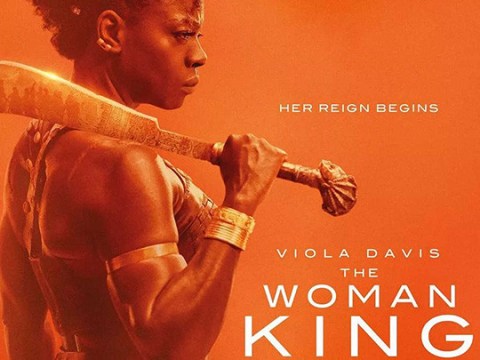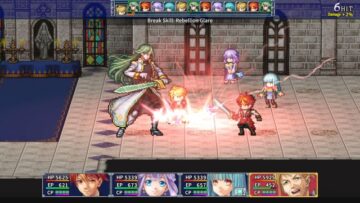
The Woman King has been spending more time on the news than our screens in recent weeks. There’s the Andrea Riseborough controversy, as the campaign to get her nominated shut out Viola Davis’s run for a Best Actress nom at the Oscars, sparking the #OscarsSoWhite hashtag. And there’s been pushback on the film’s plot. The Woman King positions its main characters, the Dahomey people, as slave trade busters, when historians are quick to point out that the Dahomey held onto that very trade for as long as they possibly could. There’s an argument that the film has pulled off a slightly too convenient 180 flip on the topic.
If we’re being brutally honest, those controversies have made watching The Woman King more of a fascinating prospect. Does Viola Davis give a performance that screams Oscar robbery? Is the story tactless around the topic of slavery? And most of all, is it any good? It’s all hand-rubbingly intriguing.
For those who have dodged the external meta-plots of The Woman King, it’s worth reminding of the actual plot. It largely follows the stories of two women: Nanisca (Viola Davis), the leader of the West African Agojie, elite female soldiers who protect the Dahomey tribe; and Nawi (Thuso Mbedu), a young woman who chooses to join the Agojie instead of being forced into a marriage with an abusive palm-oil farmer. Nanisca is initially wary of allowing Nawi into the Agojie; she is hot-headed to the point of arrogance, and Nanisca fears that makes her volatile, something the Dahomey can’t afford, since teamwork makes the dream work.
This is set against a backdrop of tension. The Dahomey have a young and newly crowned king, Ghezo (Jon Boyega), who has to deal with the Oyo Empire, a rival and growing tribe who outnumber the Dahomey by two-to-one. The Oyo are beginning to make a play, invading satellite villages and requesting greater tributes. There’s no doubt that this is building to a head. Meanwhile, the white man stirs the pot, offering guns and horses to the Oyo, while handing over gold for any slaves that the Oyo and Dahomey wish to sell.
These aren’t stories that we’re used to experiencing on whacking great AAA blockbusters. The Woman King has clearly had a large deal of money lavished on it, perhaps thanks to the extraordinary success of Black Panther. That Big Studio Money has given us a period piece in West Africa, which is not afraid to shine a light on slavery, the abominable acts of white men in Africa, and Africans ruling, living and fighting each other on-screen without the pull of the narrative being centred on non-Africans. And the result is that we came out seeing and feeling things that we hadn’t before.
The Woman King is at its best when it brings its large cast together. The Nawi storyline allows the Dahomey women to train, fight and dance in ceremonies that are awash with colour. The costumes and sets of The Woman King are Oscar-worthy, even if the actresses have not been nominated. And it’s in these scenes where you get to see the stern, feared Akojie loosening up and letting their characters through. Lashana Lynch, recently seen in No Time to Die and Roald Dahl’s Matilda: The Musical, is a beacon of light here, playing her Izogie as a smirking hyena in early scenes, before becoming Nawi’s dependable wing-woman in the second half.
It’s easy to imagine that The Woman King is a pure action flick from trailers, but the film’s template is more Full Metal Jacket than Commando. Much of the first two acts of the movie are centred on the Akojie new-recruits, watching as they are taken through their paces by Nanisca and crew. It’s more about their suitability as soldiers, their relationships with each other and their mentors, than it is about seeing them in action.
That Full Metal Jacket flow irked a little, as The Woman King started to truck with cliche. You know full well that Nawi is going to win over the stoic Nanisca. She will make mistakes along the way, perhaps even skirt with being chucked out of the tribe, but eventually she will be embraced and kick some Oyo ass. When a romantic subplot is half-heartedly thrown in, and a mid-movie twist is improbably resorted to, you might let out a sigh much like we did. While The Woman King is absorbing and its setting is undoubtedly new, the plot can be rickety.
The same goes for the direction, which is purely functional. The Woman King’s beauty comes from its celebration of Dahomey customs, its costumes, and the garrulous performance of Lashana Lynch. But the direction is rarely something that takes you aback. With such a picturesque backdrop, you feel that it really could or should have taken the breath away, and the formulaic-ish plot could or should have given breathing room for directorial flights of fancy. But this is a somewhat safe handling of a golden opportunity.
What about Viola Davis? A nominee at the BAFTAs, Screen Actors Guilds Awards, Golden Globes and more, she found herself left off the card at the Oscars. We’d say that her Nanisca is an unshowy role which absolutely plays to Davis’s strengths. She’s a wall, an inscrutable force in the Agojie, until that wall takes such a battering that cracks appear. Perhaps the bar has been set so high by Viola Davis’s other performances: while she is undoubtedly excellent, this is not close to being her best, and she takes on the unfortunate burden of some of the film’s clumsiest cliches.
There’s nuance to be had in the slave trade criticisms. We can’t argue against the point that the Dahomey are disingenuously portrayed as a tribe determined to shake off the yoke of slavery; it’s a central plot point and motivation for so many of the last act’s twists and turns. But the writers Dana Stevens and Maria Bello don’t let the Dahomey wash their hands of it completely: it’s abundantly clear that the Dahomey wouldn’t be anywhere near as powerful or rich without their all-in adoption of the slave-trade, and their hypocrisy is called out multiple times. But we also cannot deny that the heroic heel turn in the final act is galling to anyone who knows the truth of the period.
When taken as a weightier action movie, exploring topics and parts of the world that are rarely seen in modern cinema, The Woman King works. There are performances here that fizz with life, and the costumes and set design bring equal colour. But the direction and plot can’t keep up. They’re so creakily conventional that they occasionally undo the good that’s being done elsewhere.
So, if you can, park the controversies that surround The Woman King, schedule in some reading around of the topic for later, and settle in for a period biopic, bursting with energy, that tells a familiar story within an unfamiliar setting.
You can buy or rent The Woman King from the Xbox Store
Over the next few weeks, we are going to be trying something new: we’re going to be reviewing some of the new releases in the Xbox Film and TV Store. Let us know what you make of these features in the comments below.
TXH Score
3.5/5
Pros:
- A very un-Hollywood setting and theme
- Stellar performances, particularly from Lashana Lynch
- Lavish costumes, sets and musical moments
Cons:
- Static and staid direction
- Plot errs to the conventional
- Carries unwanted meta baggage
Info:
- Massive thanks for the free copy of the game go to – Purchased by TXH
- Running time – 2hr 14 mins
- Age rating – TBC
- Release date – 2022
- To rent – $5.99 SD, HD, UHD
- To buy – $7.99 SD, HD, UHD
- SEO Powered Content & PR Distribution. Get Amplified Today.
- Platoblockchain. Web3 Metaverse Intelligence. Knowledge Amplified. Access Here.
- Source: https://www.thexboxhub.com/the-woman-king-film-review/
- 100
- 2022
- AAA
- About
- Action
- actors
- Adoption
- africa
- African
- Against
- AI
- All
- Allowing
- around
- as
- awards
- backdrop
- bar
- Beauty
- becoming
- before
- beginning
- BEST
- BIG
- breathing
- bring
- brings
- Building
- burden
- buy
- Campaign
- celebration
- central
- characters
- cinema
- clearly
- comments
- content
- controversy
- convenient
- conventional
- could
- Crew
- customs
- date
- deal
- dependable
- Design
- DID
- direction
- Early
- elite
- empire
- energy
- experiencing
- Exploring
- External
- extraordinary
- familiar
- fascinating
- fears
- Features
- fight
- Fighting
- Film
- Final
- First
- Flights
- flow
- follows
- forced
- Free
- full
- game
- given
- going
- Gold
- good
- great
- greater
- Growing
- guns
- Handling
- hands
- head
- here
- High
- horses
- HTTPS
- IT
- join
- kick
- King
- large
- last
- leader
- light
- Little
- living
- Long
- make
- MAKES
- man
- Meanwhile
- Men
- Meta
- metal
- Microsoft
- might
- Modern
- money
- more
- motivation
- movie
- multiple
- musical
- narrative
- Near
- New
- New Releases
- news
- No Time To Die
- offering
- One
- Opportunity
- Oscar
- Other
- People
- performance
- Performances
- period
- plato
- plato data intelligence
- platodata
- platogaming
- play
- Playing
- Point
- pot
- powerful
- prospect
- protect
- purchased
- quick
- Rating
- Reading
- recently
- Relationships
- Releases
- Rent
- result
- review
- rich
- Rival
- robbery
- role
- room
- ruling
- Run
- safe
- satellite
- Screen
- SD
- sell
- set
- setting
- shine
- So
- something
- Spending
- started
- store
- Stories
- Story
- storyline
- strengths
- studio
- success
- such
- tells
- The
- The Game
- the world
- things
- Through
- time
- times
- together
- topic
- Topics
- trade
- Trailers
- Train
- truck
- tv
- twist
- twists
- undoubtedly
- unfamiliar
- unfortunate
- up
- us
- Viola
- volatile
- weeks
- well
- West
- west africa
- What
- white
- WHO
- win
- within
- woman
- Women
- Work
- works
- world
- worth
- xbox
- yoke
- young
- zephyrnet










